The Kyrie case isn’t about ‘Blacks vs. Jews.’ It’s about bigotry.
(JTA) — A powerful revival of “Parade,” the 1998 Broadway musical about the 1915 lynching of the Jewish factory manager Leo Frank by a Georgia mob, is wrapping up a short-term engagement at New York’s City Center. The show is stirring and moving without trivializing or exploiting one of the worst antisemitic incidents in U.S. history.
And yet I couldn’t quite shake my discomfort that this lavishly orchestrated, heart-tugging musical about the post-Reconstruction South was focused on the lynching of a white man. Alfred Uhry, who wrote the book, and Jason Robert Brown, seem to have anticipated this. They include a song, sung by two Black characters, noting that the Frank case would not have gotten half the attention it did if Frank or the girl he allegedly killed were Black.
For all the glorification of Black and Jewish cooperation in the civil rights era — some of it exaggerated, much of it deserved — the two communities have long been locked in this kind of competitive suffering. Black leaders have questioned Jewish claims to victimhood — especially when Jews accuse other Black leaders, such as Louis Farrakhan, of antisemitism — and have accused Jews of amplifying the power and reach of Black antisemites for their own ends.
Jews, meanwhile, resent being told that, as a community that tends to be seen as white, successful and politically influential, they can’t be regarded as victims of bigotry, especially when it comes from a disempowered minority.
Both dynamics have played out in the case of Kyrie Irving, the Brooklyn Nets star who shared a link to “Hebrews to Negroes: Wake Up Black America,” a 2018 film that contains a host of antisemitic tropes and that is based on a book that, no doubt thanks to Irving, is now a bestseller. In defending his decision to share the film — and giving it perhaps the widest platform it ever enjoyed — Irving downplayed his own sizable Twitter following and influence. “You guys come in here and make up this powerful influence that I have … [and say], ‘You cannot post that.’ Why not? Why not?” he asked reporters.
The canards shared in the film — especially the notion that Blacks are the “real” Jews — are rooted in the idea that “the greatness of Black men is being hidden or stolen from them,” as Jemele Hill, a Black sports journalist, explains in a piece in the Atlantic. What dismays Hill and other critics of Irving — Black, Jewish, both and neither — is that this understandable impulse to promote Black empowerment draws on a history of classic antisemitism: The film cites Henry Ford’s antisemitic opus “The International Jew” and denies the Holocaust. It claims that Jews have used falsehoods to “conceal their nature and protect their status and power.”
Writes Hill: “Irving has joined a troubling club of high-profile Black male celebrities — also including the rapper Kanye West — who have stubbornly embraced conspiracy theories, particularly anti-Semitic ones, under the pretext of seeking a deeper truth about their own origins.”
Some white liberal Jews are uncomfortable about calling out certain forms of antisemitism by prominent Blacks precisely because of a perceived power imbalance between Blacks and Jews, or because the ideas come from a place where ignorance meets legitimate grievance. Some Black leaders have similarly excused the long history of antisemitism and bigotry by Farrakhan’s Nation of Islam because the group has been seen as a force for good in impoverished Black communities.
And still others have suggested that Ye, with a history of mental illness, and Irving, who often dabbles in conspiracy theories, should not be subjected to the blunt outrage used to combat white supremacy and anti-Zionism. Or that none of us should be in the business of “policing the expression of Black athletes,” as the sports journalist Shireen Ahmed put it (before condemning Irving, it should be said).
These attitudes are patronizing, and it’s important to note that few if any influential Jews or Black commentators went there this week. West and Irving had few defenders for the antisemitic things they said or shared (although there was some Twitter “what-aboutism” suggesting the NBA was more concerned about a Black man’s antisemitism than China’s treatment of the Uighurs — a sticking point for a league that does major business in China).
On the left, Dave Zirin of The Nation writes about the link between racism and antisemitism and the far right: “What terrifies me about the current moment is that Kyrie’s politics are migrating and finding a sick alliance among Nazis, fascists, nationalists, and all manner of white supremacists who have long promoted these notions but wanted no part of Black politics unless it was about expressing common separatist ideas.”
As Zirin suggests, the canards West and Irivng are sharing are hardly unique to the Black community. Antisemitism and racism are social prejudices “that all peoples and societies fall prey to,” is how Kendell Pinkney, who is Black and Jewish, put it in a JTA essay.
The Jewish community doesn’t have the luxury of condescension when celebrities, however troubled, insert insidious ideas into the social media ecosphere. On Thursday, as the Nets, Kyrie, the NBA and the Anti-Defamation League were going back and forth on how to defuse his behavior, the FBI warned New Jersey synagogues of a credible “broad threat” against them, apparently from a man, so far unidentified, who holds “radical extremist views.” Jews are vigilant about diehard conspiracy theories, political dog whistles and online harassment not because they want to “protect their status and power,” but because they have seen spasms of deadly violence inspired by garbage shared online.
Late Thursday night, Irving at last apologized for his tweet, writing, “I posted a Documentary that contained some false anti-Semitic statements, narratives, and language that were untrue and offensive to the Jewish Race/Religion, and I take full accountability and responsibly for my actions.” His statement came after the Nets suspended him for a minimum of five games.
It’s not clear what other acts of contrition he might undertake, but I suggest he read up on the Leo Frank case, in which a Jewish man was falsely accused of murder by the same bigots who enforced Jim Crow. He might learn that when it comes to confronting hate and bigotry, Jews and Blacks have more to gain by listening to one another than tweeting about each other.
Birmingham, Alabama, synagogue fire wasn’t an antisemitic attack, rabbi says
(JTA) — A man was taken into custody after authorities in Birmingham, Alabama, investigated a suspicious fire adjacent to a synagogue there on Friday.
The fire, which came as Jews across the United States are on high alert, was determined not to be motivated by hatred against Jews, Rabbi Steven Henkin of Temple Beth-El told congregants over Shabbat. The man had also set other fires in the city, Henkin said authorities had determined.
“There is no evidence of an antisemitic attack,” Henkin said during Friday night services, which were streamed on Facebook. “He has admitted to lighting it and said it had nothing to do with us being a synagogue.”
But the rabbi, who addressed the incident again against during Saturday morning services, said the motive for the incident was almost immaterial at a time of rising antisemitism in the United States.
“It doesn’t really matter whether it was antisemitic or if it wasn’t. When we didn’t know, it certainly felt like it could have been,” Henkin said. “As a community, we should all be grateful that it wasn’t and it still makes us a little fearful and scared and anxious that with everything going on in the world as it is, we are aware that it just as easily could have been.”
The fire took place while synagogues in New Jersey were under an FBI warning about a “broad threat” to them; a man there was taken into custody on Friday and the threat was lifted. Meanwhile, antisemitic comments by rapper Kanye West have focused attention on Jews and the hatred they face. White supremacist hate groups, including the Goyim Defense League, have adopted West’s comments as a rallying cry, ratcheting up their activity across the United States. Meanwhile, a change of leadership at Twitter has spurred antisemites to target Jews and other minorities online, and NBA star Kyrie Irving has faced consequences after endorsing an antisemitic movie.
The Birmingham incident quickly drew national attention, including from antisemitism watchdogs. But authorities there determined that it was unrelated, Henkin said.
Beth-El community members observed evidence of a fire in a breezeway on the Conservative synagogue’s campus and alerted authorities early Friday morning, according to an account published by the Birmingham Police Department. Police found that a propane tank wrapped in clothing had been set ablaze inside a locked area of the campus; they also used a robotic device to assess a backpack found at the synagogue, which was determined not to contain explosives, and the community was cleared to return to the building during Shabbat.
Temple Beth-El is one of four synagogues in Birmingham, a 150-year-old community with about 6,300 Jews, according to a 2016 study by the Birmingham Jewish Federation.
Henkin and others present at Friday night services said the synagogue’s safety plan, created in conjunction with the Jewish nonprofit Secure Community Network, had been effective.
“The security system worked, which was good, and the communal response was fantastic,” Henkin said, noting that Jewish and non-Jewish leaders in Birmingham had reached out to offer support, as had representatives of national Jewish organizations. He added, “It was a scary time and we were not alone.”
Henkin referenced the New Jersey threat, West and Irving during his speech on Saturday morning, when he again offered details about the incident at Beth-El and told his congregants that it was valid for them to feel attacked even if authorities had determined they were not targeted because they are Jewish. Still, he said, the right response was not to give in to fear of antisemitism.
“There are lots of ways we can react to yesterday,” Henkin said. “We could become scared, frightened and fearful and let it affects us. We can pull ourselves back, withdraw, put up barriers and walls as a way to protect ourselves. We can be angry, hurt and pained and allow that to make us lash out at anyone and anything. We can refuse to hear anything or anyone but what we want to hear and hate everyone else for what suffering they caused us,” he said. “Or we can overcome those feelings and be present here today, recognizing we are not alone.”
Temple Beth-El was one of at least four synagogues in the South targeted in a wave of bombings in the late 1950s; the bombings were widely understood to reflect white resentment against Jewish participation in the movement for Black civil rights. None of the Birmingham culprits were caught in part because the FBI declined an invitation to investigate, a U.S. Senate hearing in 1959 revealed. The synagogue erected a plaque commemorating the bombing, which was thwarted, in July.
After criticism, Taylor Swift adds Orthodox-friendly dates to her upcoming tour
(JTA) — “You’re On Your Own, Kid,” isn’t just the name of a track on Taylor Swift’s newest album — the phrase describes the way many of the pop star’s Jewish fans were feeling after she released the dates for her upcoming tour.
This week, Shabbat-observant Swifties voiced their disappointment with the dates, which were all slated for during or just after the end of the Jewish Sabbath, on Friday or Saturday nights. (There was one scheduled for April 2, a Sunday, in Arlington, Texas.)
In response, Swift added eight more shows to the U.S. leg of her tour on Friday, all on weeknights, in cities such as Philadelphia, Seattle and Los Angeles. Many applauded the additions.
Swift’s “Midnights” album sold over a million copies in its first week, and she is now tied with Barbra Streisand as the female artist with the most albums to top the Billboard chart. The singer will take the Jewish Haim sisters, who feature in the music video for Swift’s song “Bejeweled,” along for part of the tour.
An Orthodox favorite, Lee Zeldin discusses his Democratic grandparents and Reform upbringing
(New York Jewish Week) — If Lee Zeldin pulls off an upset win over incumbent Gov. Kathy Hochul in the election next week, he will be the first Jewish Republican governor in New York State history.
If so, he probably won’t be able to thank the majority of the state’s Jews, who like Jews elsewhere, tend to vote Democratic and, polls show, tend to reject the kind of pro-Trump conservatism Zeldin represents. (Zeldin voted against certifying the 2020 presidential election results.)
And yet his tough-on-crime stance and hands-off approach to yeshivas has gained him considerable traction within the Orthodox community, a minority within a minority whose votes are coveted by politicians across New York. Although Zeldin’s own Jewish background is in the non-Orthodox denominations — he is the grandson and grand-nephew of prominent Reform and Conservative Jews — his conservative views have won him major endorsements from Hasidic and Haredi Orthodox groups in Brooklyn and the Hudson Valley.
Zeldin, one of two Jewish Republicans in the House of Representatives, was elected to Congress in 2014 after serving as a state senator. A resident of Shirley, a hamlet in Long Island’s Suffolk County, he is a member of the B’nai Israel Reform Temple in nearby Oakdale.
In an interview Friday, Zeldin, 42, told the New York Jewish Week that he attended Hebrew school at B’nai Israel as a child — and that his twin 16-year-old daughters, Mikayla and Arianna, had their bat mitzvahs there as well. (Although his Mormon wife, Diana, did not convert to Judaism, the Zeldins are raising their kids Jewish.)
“Growing up, my exposure to Judaism was across many different forms of Judaism,” Zeldin said. “That continued into and past college up into today.”
Asked about his upbringing in Shirley, Zeldin said it was sometimes Reform, sometimes Conservative, “depending on who [in the family] we were with.” In addition to B’nai Israel, the family often attended the Farmingdale Jewish Center, a Conservative synagogue that was founded by his grandfather, Abraham Jacob “Jack” Zeldin.
“My interactions, values, lessons, wisdom passed along, was most often passed along from my grandfather, Jack,” Zeldin said.
In a 2010 letter in support of Zeldin’s bid for the state Senate, Zeldin’s grandmother Jean wrote that she and Jack were “life-long Democrats,” but they still support their grandson, “even though he is a Republican.”
“He is the only Republican we have ever supported, not just because he is our Grandson, but because he is a wonderful human being and good Jew,” Jean Zeldin wrote. “There are not enough Jewish Republicans.”
Zeldin said the synagogues and congregations he interacts with now are “all across the spectrum,” but has had more involvement with Chabad and Modern Orthodox synagogues over the last few years.
“There are many important values that help build character when faced with a decision,” he told the New York Jewish Week in 2014, when asked how Judaism influences his way of thinking. “The best thing you can do when you have a strong sense of right and wrong is to do what your gut tells you is right.”
His great-grandfather Morris A. Zeldin was one of the founders of what is now UJA-Federation of New York, one of the largest Jewish organizations in the world. He was called a “a pioneer in the Zionist movement” in a 1927 New York Times obituary. Morris came to the U.S. in 1912 from Petrokov, Russia, and was close to a number of Jewish leaders worldwide, including the first president of Israel, Chaim Weizmann.
Lee Zeldin’s great-uncle, Isaiah Zeldin, was a prominent rabbi who moved from Brooklyn to Los Angeles in 1954. Isaiah Zeldin grew up with his father, Morris, in a “Zionist, Hebrew-speaking household,” the Jewish Journal, a local weekly, wrote in 1995.
Isaiah founded the Stephen Wise Temple, now a large Reform congregation in Bel Air, in 1964. According to the Jewish Journal, Isaiah Zeldin turned “a remote hill” into a congregation that, at the time, served “more people than any other synagogue in the world.” The Stephen Wise Temple did not respond to requests for comment.
When Isaiah died in 2018 at the age of 97, Lee Zeldin invoked his great-uncle’s name on the House floor, calling him “Uncle Shy,” a nickname for Isaiah.
“His father’s picture, Morris, is in my office,” Lee Zeldin said in his remarks, adding, “We will honor you, your legacy and your impact for generations to come.”
Isaiah also had a relationship with prominent politicians over the years, foreshadowing his great-nephew’s career in public office. The rabbi had his photo taken with Presidents George Bush and Bill Clinton, as well as former Secretary of State Henry Kissinger. Local council members also came to his synagogue to speak.
The Jewish Journal article said that Isaiah had “a reputation as a right-winger as far as Israel is concerned.” This stance may inform some of Lee Zeldin’s policies toward Israel — the candidate is a strong supporter of the Jewish state and has spoken out against the Iran deal.
Zeldin said his communications with his relatives were always “personal, not political,” adding that his interactions with Isaiah became less frequent throughout Zeldin’s life.
“When we did have an opportunity to interact, it was a very meaningful time that was spent together as a family,” Zeldin said. “These weren’t political interactions, they were personal family interactions.”
As the rare Republican Jew in Congress, the candidate noted that he “wouldn’t paint all Jews with one broad brush.”
“I wouldn’t paint the entire Jewish community one way or the other,” Zeldin said. “People have different priorities. In the halls of Congress, there are far more Jewish Democrats, and in many respects, we have found many opportunities to be able to work together on issues where we can find common ground.”
In 2017, Zeldin introduced the bipartisan Israel Anti-Boycott Act, which would allow states to block contractors who support the anti-Israel boycott. It still has not been passed.
Lee Zeldin’s other great uncle, Bernald Zeldin, 98, was the founding president, in 1959, of the Jewish Center of the Hamptons. Today, the Reform synagogue meets in an architecturally significant building in East Hampton and is known for its Friday night services on the nearby beach.
Recalling the synagogue’s founding in an essay obtained by the New York Jewish Week, Bernard Zeldin called it “a labor of love — a love for the Jewish people, a love of the Jewish religion, a love for my Jewish heritage, and a love for the State of Israel — all passed down to me from my Mother and Father.”
The Jewish Center of the Hamptons’ current rabbi, Joshua Franklin, told the New York Jewish Week in an emailed statement that “there is not much to say” in regards to the temple’s relationship to Rep. Zeldin.
“He has visited a few times in the past, I believe, and his family was here when we honored Bernie Zeldin in 2019,” Franklin said.
Lee Zeldin, an only child, was born in 1980 to Merrill Schwartz and David Zeldin. He graduated from William Floyd High School in Mastic Beach in 1998 and went on to earn a bachelor’s degree from the State University of New York at Albany and a law degree from Albany Law School.
After serving in the army from 2003 to 2007 — which Zeldin said has informed his “outlook on foreign policy, understanding threats, and how to build and participate in a coalition of allies to get something productive done” — he launched his own law practice in 2008, where he worked until his election to the New York State Senate in 2010.
Most polls have Hochul ahead of Zeldin to win the election, but some have tightened over the last few weeks. As the momentum shifts, he has become a mainstay in Orthodox neighborhoods — holding large rallies, putting on tefillin with Hasidic voters and meeting with prominent rabbis across the state.
Zeldin was endorsed by the Bobov Hasidic movement, the Flatbush Jewish Community Coalition and multiple Crown Heights activists. (Hochul, meanwhile, was endorsed by the Satmar Hasidic faction loyal to Rabbi Aharon Teitelbaum of New Square in Rockland County.)
Despite his appeal among Orthodox Jewish communities on issues like crime
(he is a fierce opponent of cash bail reform) and yeshivas (he opposes new state regulations that would tighten oversight of how secular subjects are taught at the private Jewish schools), Zeldin has not always supported the social safety net issues important to a community with a high poverty rate. The Orthodox community constitutes some of New York’s poorest families, who depend upon programs that provide billions of dollars in federal funds, such as the Supplemental Nutrition Assistance Program and housing assistance.
Yet Zeldin has consistently voted no on extending government programs like social security and Medicare. Zeldin voted against a bill that reauthorized block grants for anti-poverty activities. In November 2021, he voted against the Biden plan that provides money to expand social safety programs, lower health care costs and Medicare expansion.
When asked what he would do to help low-income Orthodox families, Zeldin brushed off the line of questioning. “There are so many generalities and stereotypes in that question,” Zeldin said. “I don’t even know where to start. It’s a massively loaded question.”
Election day is Nov. 8.
As antisemitism spikes following Elon Musk takeover, ADL calls for Twitter ad boycott
(JTA) — Jewish groups thought Elon Musk was listening to them about antisemitism on Twitter. Then Kanye West came back.
In the week after the rapper who now goes by Ye lost most of his endorsements due to his antisemitic rants, and amid an apparent uptick in broader antisemitic content on the platform, the Anti-Defamation League met with Musk, the social media giant’s mercurial new owner, about keeping hate speech off the site.
Three days later, all goodwill from the meeting has devolved, as anti-Jewish content on Twitter is experiencing a “prolific surge,” according to the Network Contagion Research Institute, a firm that monitors the spread of online hate and disinformation. The institute said Friday that “terms associated with Jew are being tweeted over 5,000 times per hour,” and that “the most engaged tweets are overtly antisemitic.”
Meanwhile, West has begun calling out individual Jews, such as music mogul Scooter Braun and the sports branding businessman Jamie Salter, on his account, and online networks of antisemites have seized on Musk’s ownership as an opportunity to launch a full-court press of hateful content on the site.
Now, instead of working alongside Musk to develop new content moderation tools, the ADL is calling on all advertisers to suspend their relationship with Twitter, while offering a harsh critique of Musk’s leadership.
“We met with Elon Musk earlier this week to express our profound concerns about some of his plans and the spike in toxic content after his acquisition,” the Stop Hate For Profit coalition, a group that includes the ADL, said in a statement. “Since that time, hate and disinformation have proliferated, and he has taken actions that make us fear that the worst is yet to come.”
The group’s relationship with Musk came off the rails with stunning speed. At their initial meeting, the ADL and various members of the coalition including the NAACP, Color of Change, the Asian American Foundation and media equity advocacy group Free Press had pushed Musk to develop robust content moderation tools.
The groups also tried to get Musk to stop tweeting out conspiracy theories and problematic content himself. The entrepreneur had previously tweeted, then deleted, a link to a right-wing conspiracy theory involving a man who had attacked House Speaker Nancy Pelosi’s husband at his house (the attacker himself was active in many antisemitic conspiracy theories online).
Musk tweeted approvingly about the ADL meeting afterward (a move that enraged some of his antisemitic fans), and ADL Vice President Yael Eisenstat told Protocol that Musk had assured the groups he didn’t want Twitter to become “a hate amplifier.”
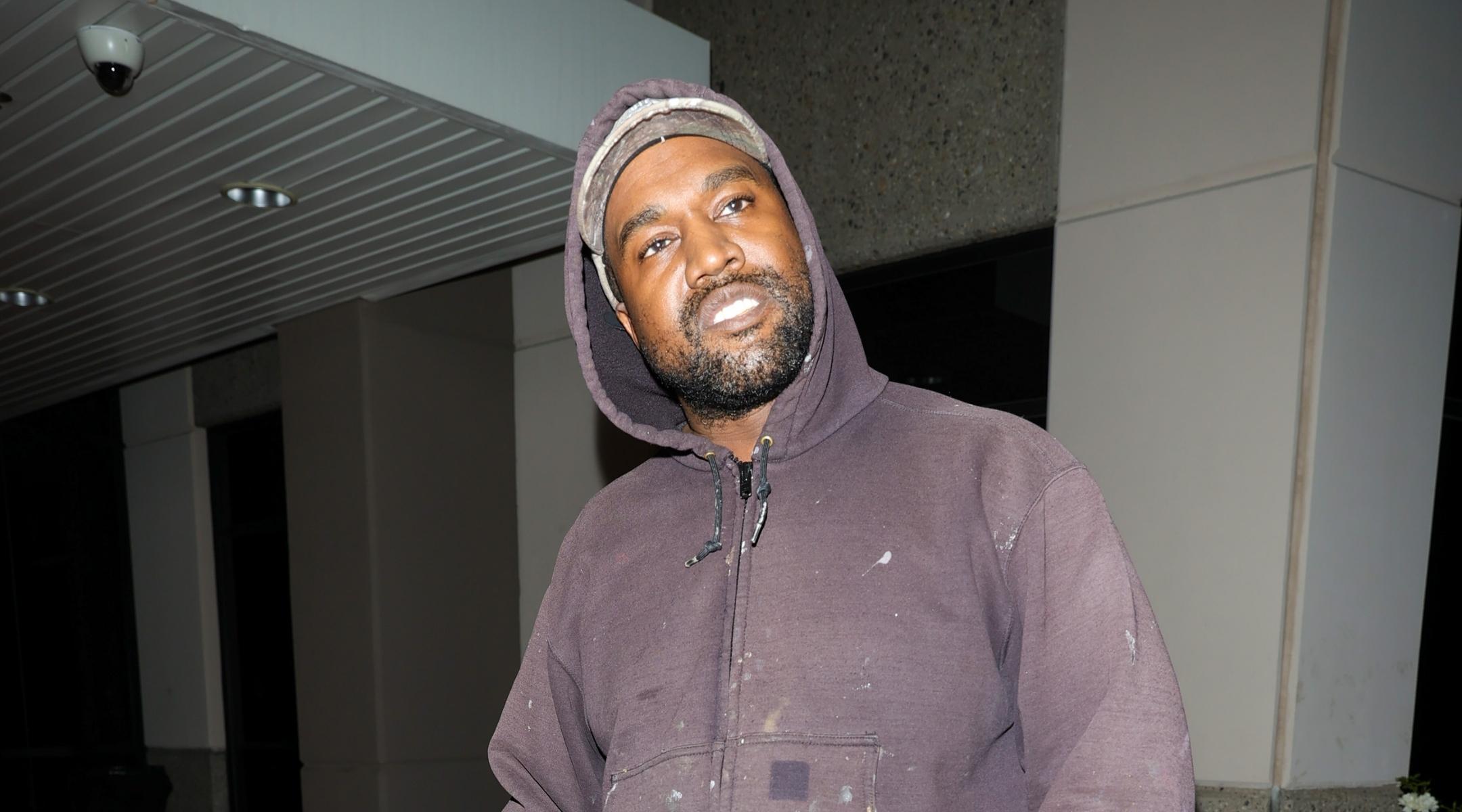
Kanye West seen in Los Angeles, Oct. 21, 2022. (Rachpoot/Bauer-Griffin via Getty)
But by late Thursday, West — one of Twitter’s most popular users, with 38 million followers — began his latest antisemitic tirade on the platform, which he had recently been reinstated on following a suspension for hate speech. Musk said he played no role in West’s reinstatement.
Seemingly prompted by the media attention given to Brooklyn Nets player Kyrie Irving in the wake of the star guard’s own antisemitism controversy, West posted a series of conspiratorial messages about various Jewish figures. Beyond Braun and Salter, he called out celebrity personal trainer Harley Pasternak and Amar’e Stoudemire — the former NBA star who converted to Orthodox Judaism in 2020 and had a brief stint as a Nets assistant coach.
“You can’t be antisemite when you know you are Semite,” West tweeted in defense of Irving, who shared a link to an antisemitic documentary. Irving had expressed the same idea in a press conference on October 29, which led the Nets to suspend him. He later apologized for his rhetoric.
In later tweets, West said, “They make us bully ourselves because of our business alignments.”
Referring to Stoudemire, who is Black and who criticized Irving for his refusal to condemn antisemitism, West wrote, “They make us attack each other[,] even our brothers who know who we truly are.”
The wording of West’s tweets made reference to common tropes that have circulated among Black Hebrew Israelite communities, including that they are the genealogical descendants of the ancient Israelites. As of Friday afternoon, West’s account remained active on Twitter.
Also recently reinstated on Twitter: the account of Mark Finchem, Arizona’s Republican nominee for secretary of state, whose account had been suspended. Finchem, who has received a reported $10,000 in donations from far-right anti-government militia the Oath Keepers despite his own insistence he is not a member of the group, regularly tweets references to Jewish billionaires George Soros and Mike Bloomberg “funding” his Democratic opponent. He has also proudly accepted the endorsement of Andrew Torba, an outspoken antisemite and founder of the Gab social media platform, which is rife with antisemitic users.
Finchem’s account was restored a little over a week prior to midterm elections and prior to Musk’s meeting with the ADL. The candidate, who also denies the results of the 2020 election, thanked Musk for reinstating him, declaring, “Twitter is much better with you at the helm.”
Like other right-wing politicians and media figures who make regular references to Soros, Finchem has said such behavior is not antisemitic. He refuted a charge of antisemitism by declaring, “I love the Jews,” but has also frequently employed language calling his opponents “Marxists,” a charge that, historically, antisemites dating back to Great Depression-era radio preacher Father Coughlin have directed at liberal or secular Jews.
All of this activity came as Twitter employees braced themselves for a round of mass layoffs Friday, with as many as half of the company’s 7,500 jobs reportedly on the line — sowing further chaos at the company as Musk has sought to rethink its top-down operations. The layoffs could endanger future efforts to craft coherent new policies around how content is moderated and how accounts are reinstated. Musk said that such a process would take “weeks.”
As Musk moved forward with his plans, and threats of real-world violence at synagogues multiplied, Jewish users expressed anger and frustration. A few said they would leave altogether.
“At this point in time, we are calling on advertisers to pause their spend globally until it becomes clear whether Twitter remains committed to being a safe place for advertisers as well as society overall,” Stop Hate For Profit said in its statement.
The Nov. 8 races that Jewish Americans are watching closely
WASHINGTON (JTA) — Consider two races in Pennsylvania.
For governor, a Jewish Democrat whose ads show off his Shabbat observance is squaring off against a far-right Republican who platforms Christian nationalists and has ties to an outspoken antisemite.
For Congress in the 7th District — which has a relatively low ratio of Jewish residents — two Jewish women candidates are going head-to-head: One is a Democrat who had her bat mitzvah in Israel as an adult, the other is a Republican Hebrew speaker who has donated at least $1 million to a university there.
The Pennsylvania stories represent the two streams of Jewish significance about this election cycle leading up to the nationwide vote on Tuesday. On one hand, an array of candidates are courting antisemitic supporters in ways that have been unimaginable for decades, as a string of high-profile antisemitism controversies threaten to turn into a moment of renewed violence against Jews.
On the other hand, the cycle also features multiple candidates who are proudly Jewish in ways that their political predecessors were hesitant to express.
Here’s a closer look at several of the races that offer a snapshot of the Jewish stakes in the election next week.
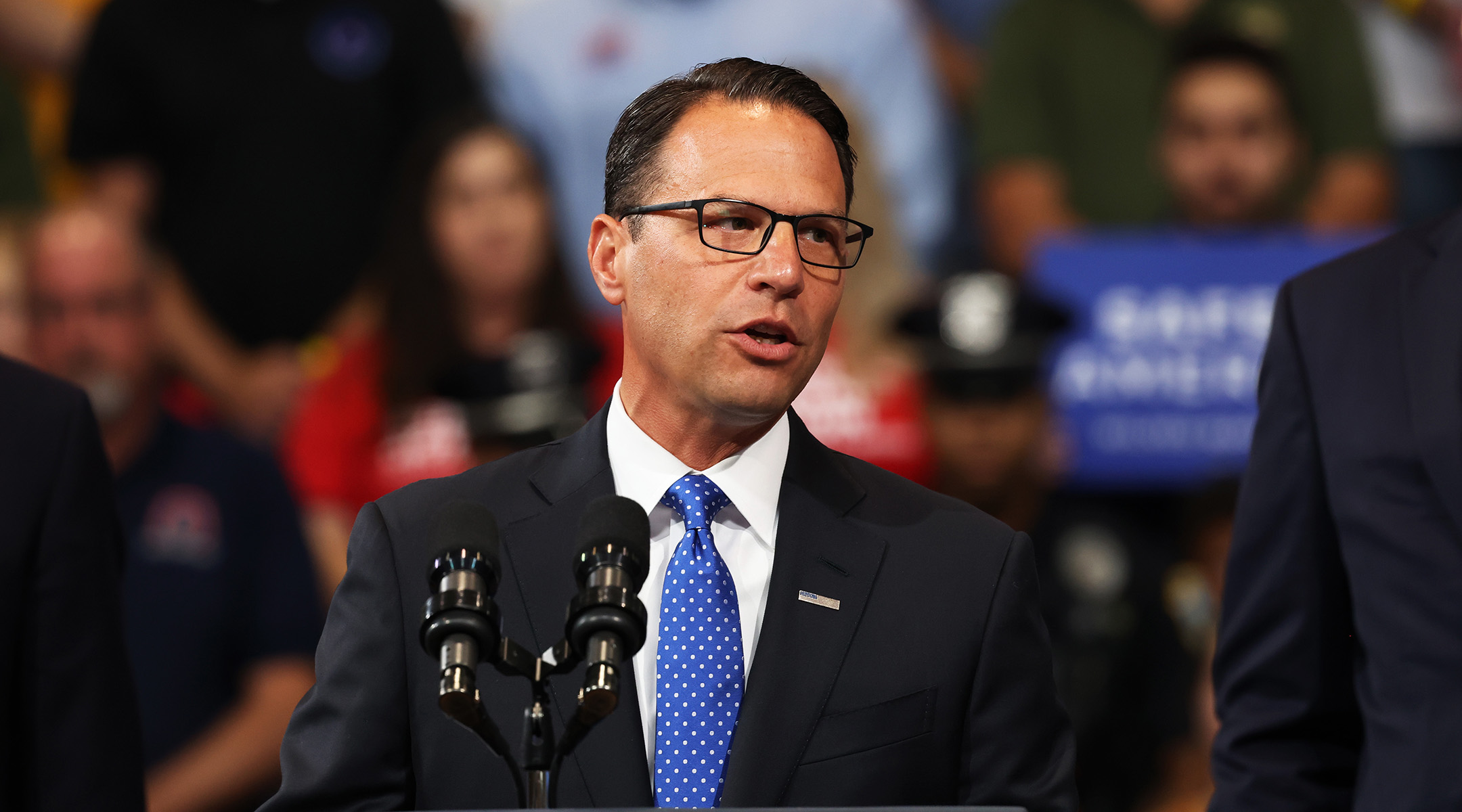
Pennsylvania Attorney General Josh Shapiro speaks before President Joe Biden takes the stage to speak at the Marts Center in Wilkes-Barre, Pennsylvania, Aug. 30, 2022. (Michael M. Santiago/Getty Images)
Josh Shapiro v. Doug Mastriano
Pennsylvania governor
Pennsylvania is often described as a state bound by two liberal enclaves — Philadelphia and Pittsburgh — sandwiching a conservative, rural middle. One reliable way for big-city politicians to reach the heartland is to wear their faith and “family values” on their sleeves, and that’s what Josh Shapiro, the state’s Philadelphia-based Democratic attorney general, did in his first ad: This is a guy, the ad conveys, who made sure to be home by Shabbat to spend time with his family.
Shapiro’s ad stood out because Jewish candidates have rarely placed their Jewish observance at the forefront of their general campaign (as opposed to campaigning within the Jewish community, where they will talk up their Jewish involvement). Shapiro bet that Pennsylvanians would understand challah on the table to be as meaningful as a Christmas tree in the corner.
It may be working — Shapiro is substantially leading his Republican opponent, Doug Mastriano. But a classic campaign tactic is to weaponize your opponent’s strength and Mastriano cast Shapiro’s children’s attendance at a Jewish day school as “elite” and “privileged.”
Mastriano, who was former President Donald Trump’s favored candidate in the primary and who was in Washington during the Jan. 6, 2021 insurrection, insists there is no malicious intent — he noted that in his attack on Shapiro he does not identify the school as Jewish. But Mastriano had already earned plenty of Jewish skepticism by paying Gab, the far-right social media site owned by admitted antisemite Andrew Torba, to promote his campaign on the platform. He then accepted a donation to his campaign from Torba after ostensibly cutting ties with him and condemning antisemitism.
Mastriano has become a poster child for the Democratic push to label Republicans as a party of extremists, and in many cases, antisemites. The Republican Jewish Coalition expressed concerns about Mastriano’s failure to fully distance himself from Torba, a rare instance of a partisan Jewish group calling out a candidate from its party.
The controversy has continued. One of his advisers said last week that Shapiro was not authentically Jewish. And when an Israeli reporter asked Mastriano about his Jewish controversies, his wife said that the family loves Israel. Even “more” than Jews love Israel.
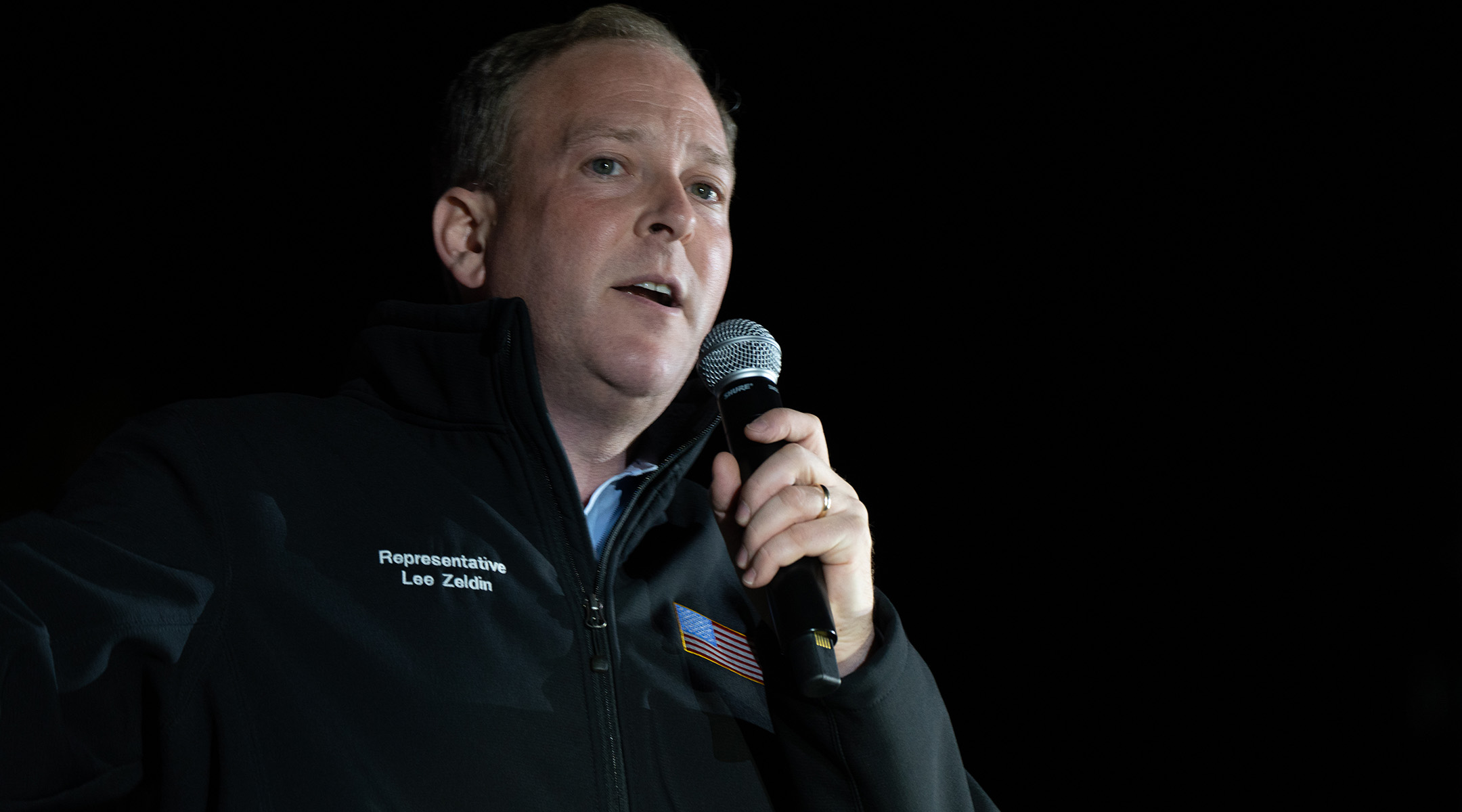
Rep. Lee Zeldin of New York campaigns in Hauppauge, New York, Oct. 29, 2022. (David Dee Delgado/Getty Images)
Kathy Hochul v. Lee Zeldin
New York governor
Rep. Lee Zeldin was considered a longshot when he announced a bid for governor of one of the East Coast’s most liberal states. The Jewish Long Islander was an avid defender of Donald Trump during his presidency, and the former president is reviled in his home state. Zeldin voted against certifying Biden for president on Jan. 6 and has opposed abortion rights.
But Zeldin, who has Trump’s endorsement, has hammered Gov. Kathy Hochul on rising crime in New York and is now within striking distance according to polls.
As one of only two Jewish Republicans in the U.S. House of Representatives, Zeldin has carved out a space for himself as one of Congress’ most vocal pro-Israel voices and is a member of Jewish congressional groups. He has earned significant Jewish community support, including millions of dollars from Ronald Lauder, president of the World Jewish Congress and heir to the Estee Lauder fortune.
But his inroads among the state’s haredi Orthodox communities has led headlines in recent weeks. After a New York Times article spotlighted the controversy over haredi yeshivas’ secular education practices, Zeldin pledged to support them, making the topic a key campaign issue in Brooklyn.
“People feel that Hochul has been silent on this issue,” an anonymous insider told the New York Jewish Week in a recent report. “They feel that Zeldin has been very vocal and hopefully when he becomes governor he’ll continue with that.”
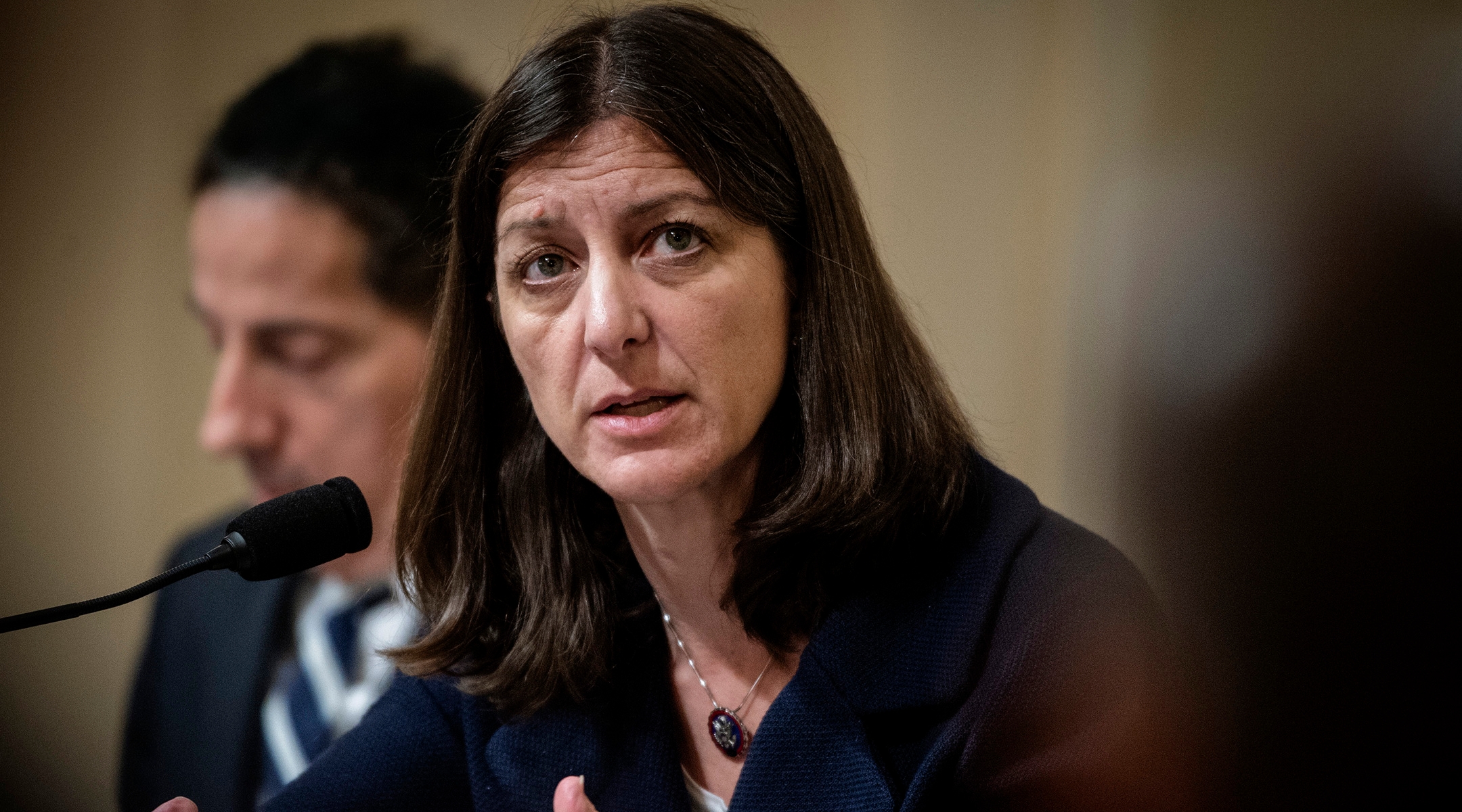
Rep. Elaine Luria questions a witness during the House Select Committee hearing investigating the Jan. 6 attack on the U.S. Capitol, July 27, 2021. (Bill O’Leary/Pool/Getty Images)
Elaine Luria v. Jen Kiggans and Elissa Slotkin v. Tom Barrett
House seats in Virginia and Michigan
In 2019, five freshmen women Democrats in swing districts rose to national prominence when they opposed impeaching Trump — then changed their minds. Their decisions gave Nancy Pelosi, the House Speaker, the green light to start the proceedings.
They were called the “badass caucus,” partially due to the fact that all five had served in the military or intelligence communities. Two of them are Jewish, and unabashedly so. Elissa Slotkin, a CIA veteran in Michigan’s 7th District, has been out front on Holocaust education legislation. Elaine Luria, a former Navy commander in Virginia’s 2nd District, ran an ad holding a weathered Hebrew bible as she explained why she backed impeachment.
Both are now in extremely tight races to stay in office.
Slotkin is facing Tom Barrett, a state senator who has peddled some of Trump’s 2020 election lies. Although she even has the backing of Republican Rep. Liz Cheney, Slotkin is battling anti-incumbent anger at inflation; most polls give her a slight lead, but some have her behind.
Luria — who is getting hit for serving on the House Jan. 6 committee (alongside Cheney), which her rival says is a distraction — is locked in an even tighter race, what most outlets are calling a 50-50 dead heat.
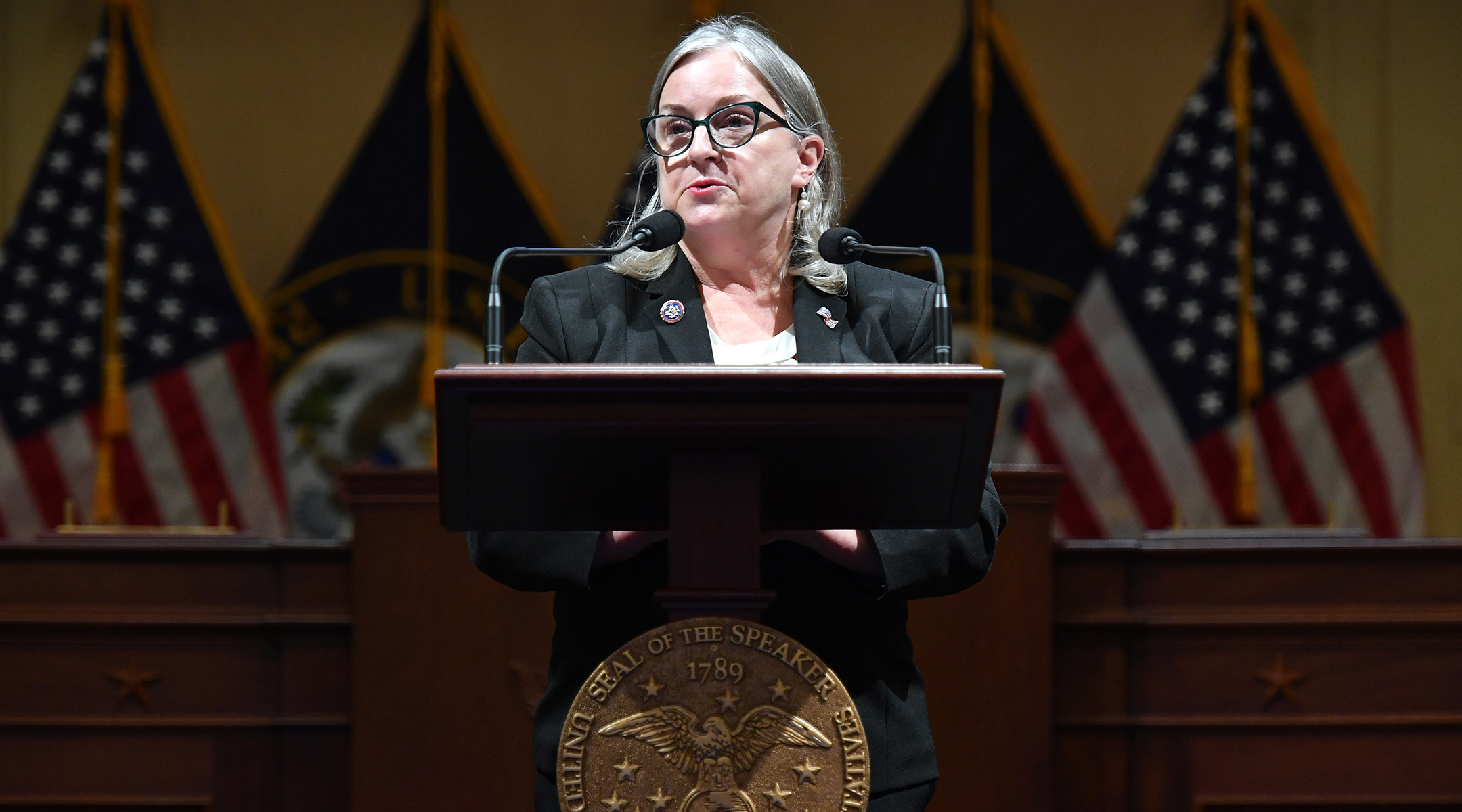
Susan Wild speaks as members of Congress share their recollections on the first anniversary of the attack on the U.S. Capitol, Jan, 6, 2022. (Mandel Ngan/Pool/Getty Images)
Susan Wild v. Lisa Scheller
House seat in Pennsylvania
Rep. Susan Wild, like Slotkin and Luria, is another Jewish woman Democrat in a swing district who is facing a Trump-endorsed candidate. Other similarities: all three districts were redrawn and now are slightly more favorable to Republicans and all three races have drawn in millions in contributions to both parties. Polls rate this one as a toss-up, too.
All three women have also risen rapidly in Democratic ranks since their election in 2018 — Wild was just named chairwoman of the House Ethics committee, one of the most sensitive leadership roles, in a sign that she has the trust of Nancy Pelosi.
There is one key Jewish difference in this race, though: Wild is facing another Jewish candidate who has also emphasized her Jewishness in her campaign.
Lisa Scheller, a businesswoman, has initiated a 2020 rematch and a rare Jew-on-Jew battle (there are only two other such races this cycle, and neither is competitive). What’s even more unusual is that the 7th District, which runs along the border with northern New Jersey and includes Allentown, is not known as a particularly Jewish hub — there are perhaps 10,000 Jews, out of a total population of over 700,000.
In 2020, they geared one of their debates for the Jewish community, talking about issues such as Israel and antisemitism. Both have emphasized ties to Israel: Scheller, a Hebrew speaker, maintains a home there and has given more than $1 million to Ben Gurion University of the Negev. Wild, whose first husband was Jewish, decided to convert when her son wanted a bar mitzvah. She then had her own bat mitzvah ceremony alongside her daughter in Israel.
If elected, Scheller, who has Trump’s endorsement, would likely bring GOP Jewish representation in the House to three, for the first time in decades. David Kustoff, a Tennessee incumbent, and Max Miller, running in an open seat in Ohio, are both likely to win.

Republican nominee for Arizona governor Kari Lake speaks at the Conservative Political Action Conference CPAC at the Hilton Anatole in Dallas, Aug. 6, 2022. (Brandon Bell/Getty Images)
Kari Lake v. Katie Hobbs
Arizona governor
Arizona has an active and engaged Jewish community, one that’s growing as more Jewish families head to the sunbelt. A 2019 survey found that the Jewish population in Maricopa County, the state’s largest and where Phoenix is situated, had grown by 19% since 2002.
There are about 115,000 Jews in the state — enough to swing this purple state’s closely-watched state-wide elections either way. President Joe Biden flipped Arizona blue in 2020, and Republicans want it back. Arizona’s Jews trend more conservative than Jews do nationwide, which might be a plus for Republicans in the state.
What’s likely not a plus in the eyes of the community is that the four Republicans in top statewide races, for governor, U.S. senator, attorney general and secretary of state have all had associations with antisemites and antisemitism.
Kari Lake, a former TV newscaster who was a registered Democrat until Trump’s 2016 election galvanized her, is running against Katie Hobbs, the Democrat who is the incumbent secretary of state. Much of the campaign has focused on election integrity, with Lake embracing some of Trump’s lies about the 2020 election. But her new friends have at times caused trouble.
Last year, she posed for a photo with a Nazi sympathizer and told him on Twitter, “It was a pleasure to meet you, too!” She endorsed and then withdrew her endorsement of an Oklahoma candidate who called Jews “evil.”
Mark Finchem, running for secretary of state, has proudly accepted Gab founder Andrew Torba’s endorsement, and the Phoenix Jewish Community Relations Council in September criticized him for spreading “antisemitic tropes” by claiming Democrats are controlled by George Soros and Mike Bloomberg, both Jewish megadonors. Finchem refuted a charge of antisemitism by declaring, “I love the Jews,” but he has also frequently employed language calling his opponents “Marxists,” a charge that, historically, antisemites dating back to Great Depression-era radio preacher Father Coughlin have directed at liberal or secular Jews.
In the wake of it all, Lake — who has similarly brought up Soros and Bloomberg and has not denounced Finchem’s tarnished campaign — has struggled to shake accusations that she is cozy with antisemites. She nevertheless holds a slight lead as of this week.
The Arizona controversy doesn’t stop there, however. Blake Masters is the Trump-endorsed candidate for Senate who hopes to unseat Democrat Mark Kelly, the former astronaut who is married to Gabrielle Giffords — the Jewish congresswoman shot at an event in 2011. Jewish Insider uncovered an article Masters wrote in 2006 for a publication in which he cites a “poignant” quote by Nazi official Hermann Goering. The publication is owned by Lew Rockwell, the libertarian who is believed to have written content for one-time Republican presidential hopeful Ron Paul that included racist and antisemitic tropes. Kelly held a wide lead earlier in the race, but that is no longer the case.
Then there’s Abraham Hamadeh, another Trump endorsee who disputed the 2020 election and who is running in a close race for attorney general. He posted antisemitic comments as a teenager on a forum for supporters of Paul, the same politician who Masters admired as a young man. Hamadeh’s campaign has said the comments were the rantings of a teenager and that he should not be judged by them.
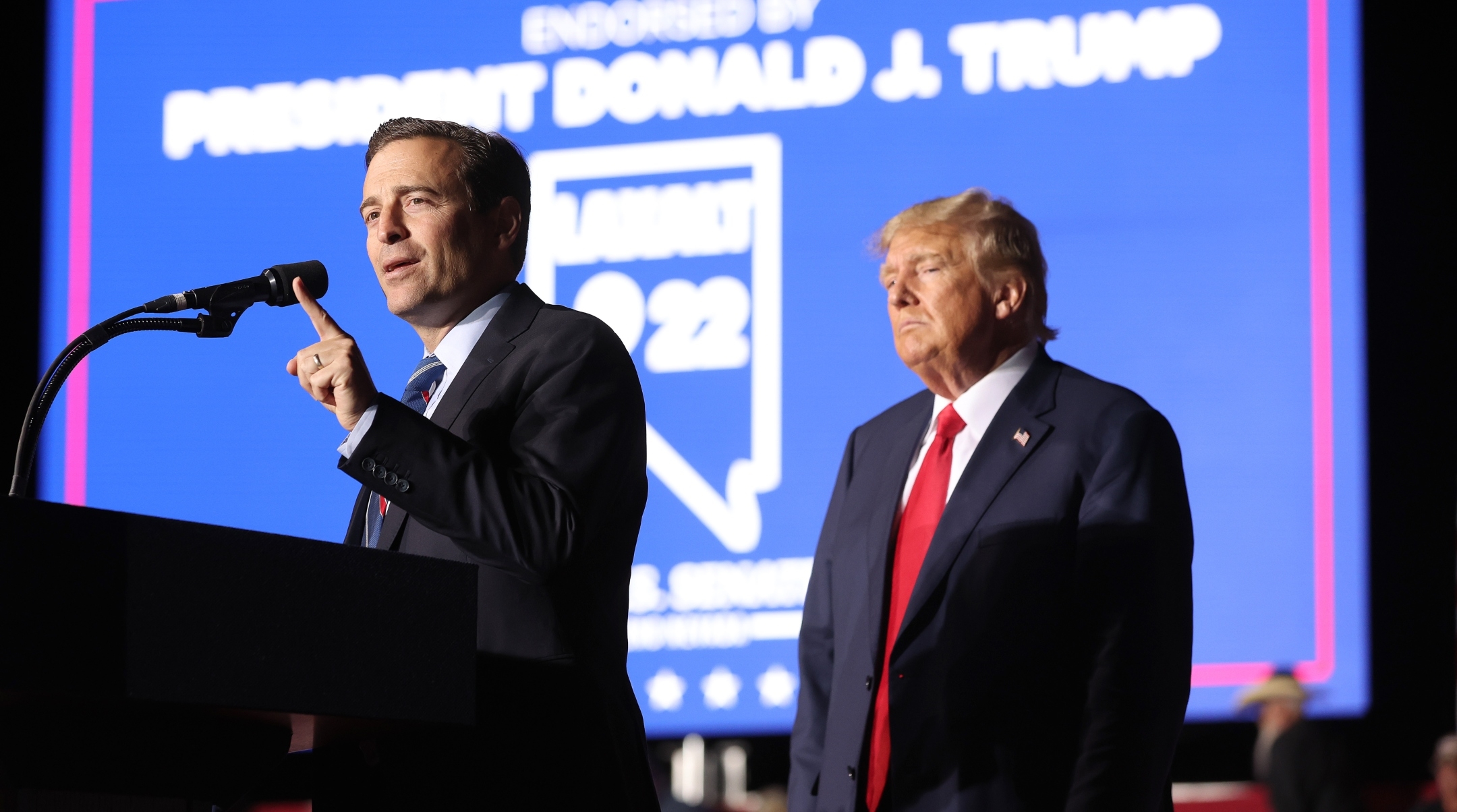
Adam Laxalt joins former President Donald Trump on stage during a campaign rally at the Minden-Tahoe Airport in Minden, Nev., Oct. 8, 2022. (Justin Sullivan/Getty Images)
Catherine Cortez Masto v. Adam Laxalt
Nevada Senate seat
Nevada’s Jewish population is also growing and could also play the role of decider in Tuesday’s elections — to the extent that Jewish partisan groups are spending time and money in the state targeting Jewish voters.
The state is hosting one of the country’s closest Senate races, between incumbent Democrat Catherine Cortez Masto and Republican Adam Laxalt, a former attorney general. Again, antisemitism is an issue in this campaign.
The Anti-Defamation League called Laxalt an extremist for his ties to the Constitutional Sheriffs and Peace Officers Association fringe group. Last weekend, Jewish Insider revealed that a former staffer for Laxalt, using a pseudonym, “LaxaltStan,” tweeted out bigoted comments about Jews, women and the LGBTQ community. Laxalt’s campaign said the staffer left the campaign in August and condemned his account’s “bigoted opinions.” The spokesman did not explain why the staffer left the campaign.
Cortez Masto convened a campaign event on Monday with Nevada’s other senator, Jacky Rosen, a Jewish Democrat, to call for greater condemnation of antisemitism.
Also on the ballot in Nevada is Sigal Chattah, a Republican who is seeking to unseat Aaron Ford as attorney general — and in the process become the first Israeli American elected to statewide office in the United States. Chattah has leaned into her Israel identity in her campaigning; her other claim to fame is leading legal battles to remove coronavirus restrictions.
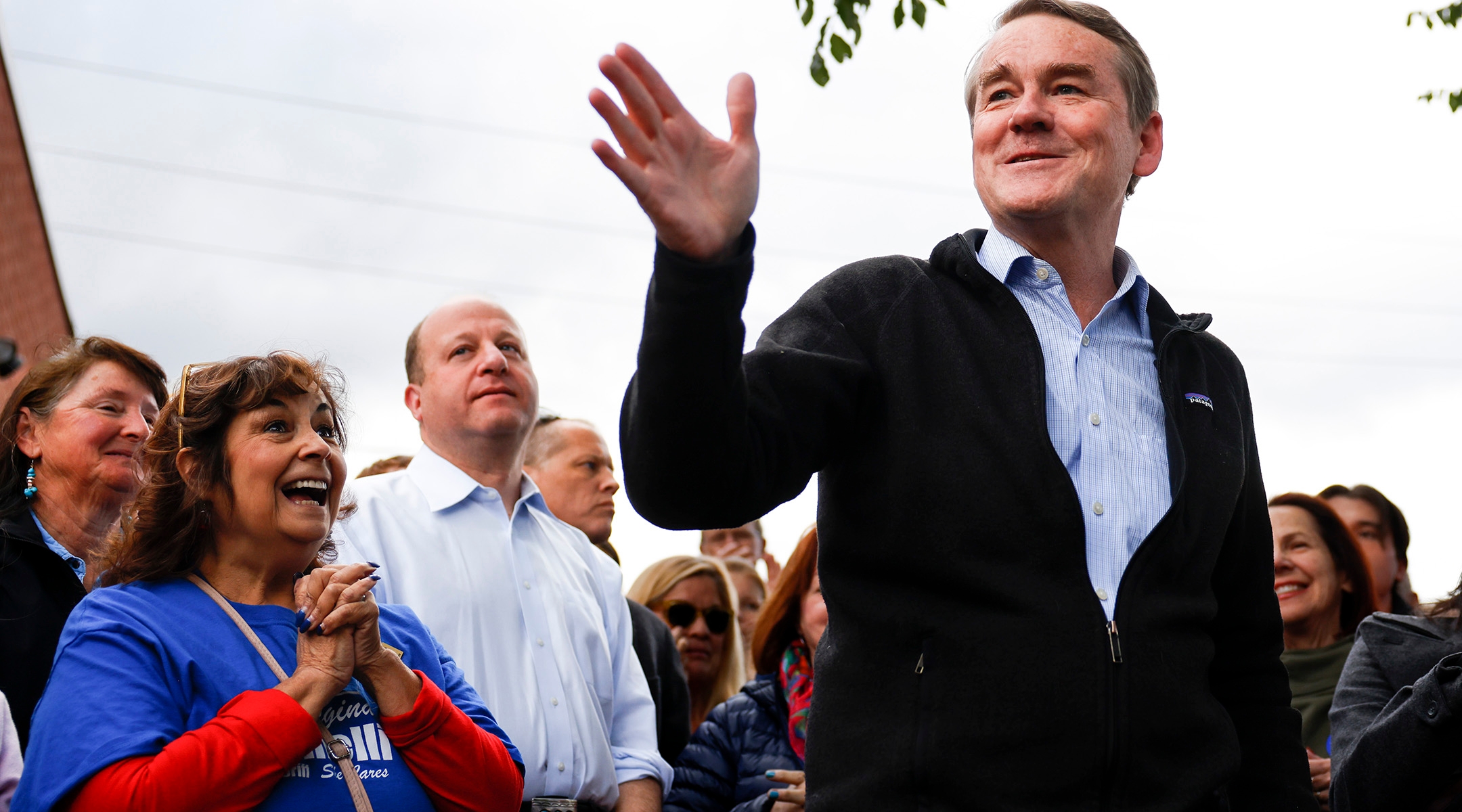
Michael Bennet of Colorado speaks to supporters at a rally outside Mountain Toad Brewing in Golden, Colorado, Oct. 26, 2022. (Michael Ciaglo/Getty Images)
Michael Bennet v. Joe O’Dea
Colorado Senate seat
Michael Bennet, first elected to the Senate in 2008, is a moderate Democrat who has survived other anti-incumbent seasons in his swing state. He has also in his campaigning noted his mother’s status as a Holocaust survivor and how it has shaped him, although he won’t say if he identifies as Jewish today.
What’s intriguing about this cycle is that the state’s Republicans broke with their party’s national trend and nominated a moderate anti-Trump Republican, Joe O’Dea, to unseat him.
It may not work — Bennet is still leading O’Dea outside the margin of error.
Colorado has three other Jewish Democrats running for stateside reelection: Jared Polis, the state’s first openly gay governor; Phil Weiser, like Bennet, the child of a Holocaust survivor who has made combating antisemitism a key theme of his first term; and Jena Griswold, the secretary of state.
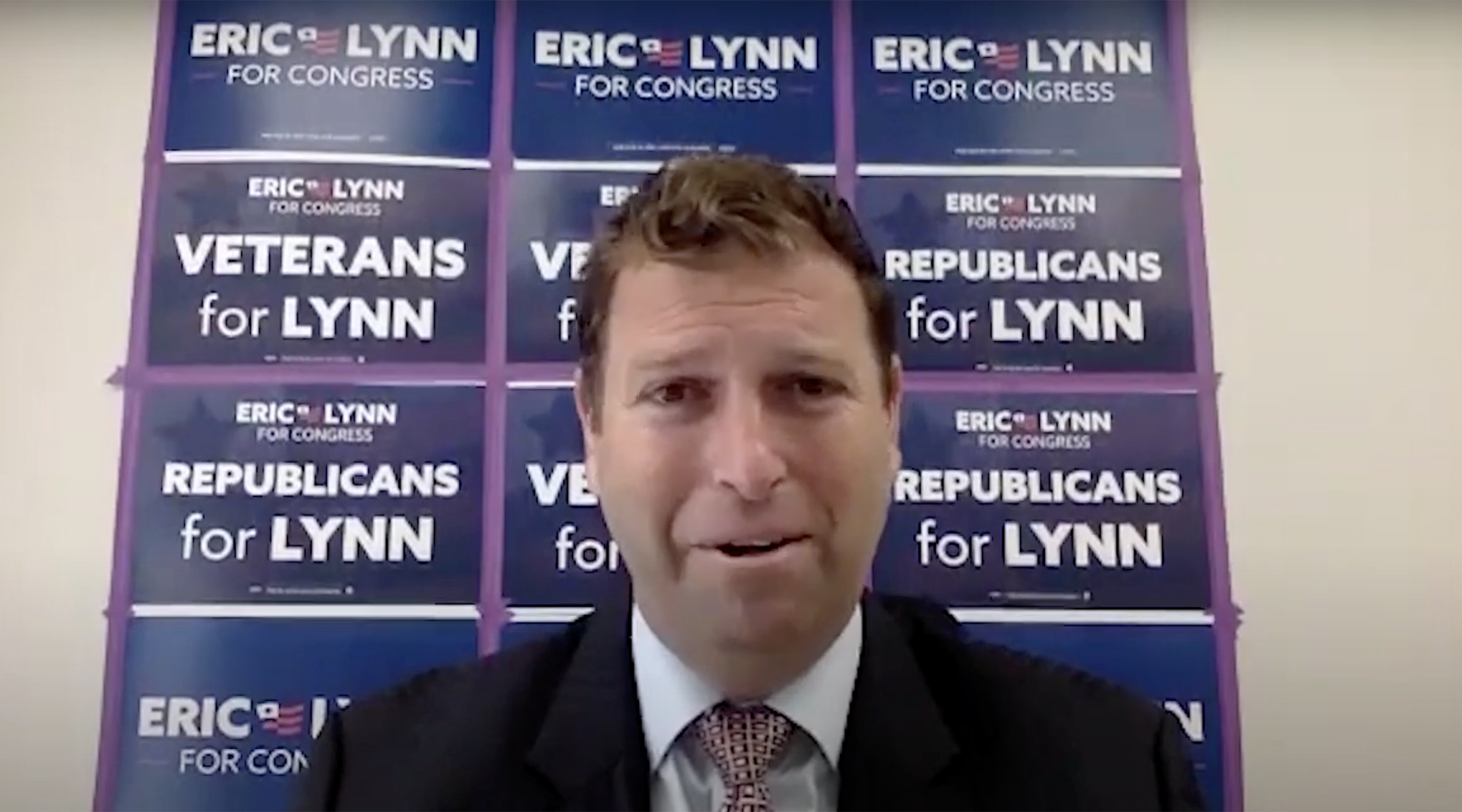
Eric Lynn of Florida speaks about his campaign with the Tampa Bay Chamber. (Screenshot from YouTube)
Eric Lynn v. Anna Paulina Luna
House seat in Florida
Eric Lynn, who has been a member of the Tampa-area Jewish community since childhood, was not given much of a shot when he launched a campaign in the 13th District.
Held for more than 40 years by Bill Young, a moderate Republican, Charlie Crist won the district for Democrats in 2016, partially because he was a former Republican governor who allied with moderate Democrats after switching parties.
Then, after Crist said he was retiring from Congress to take another shot at the governor’s mansion, Florida Republicans redrew the district to make it more Republican. The nonpartisan Cook Political Report rated it as likely to flip to Republican.
Now Lynn, a former Pentagon official who helped shepherd through funding for Israel’s Iron Dome anti-missile program, is defying expectations. Recent polls have him in a dead heat with his rival Anna Paulina Luna.
In an interview, Lynn said one of his advantages has been Luna’s extreme positions on abortion and her avid embrace of Trump and his lies about the 2020 election, as well as her alignment with a minority of Republicans in Congress who opposed the PACT Act, which expands benefits for veterans who were exposed to burn pits. Opponents say the bill expands government bureaucracy, but it’s not an argument that goes down well in a veteran-heavy district.
“Even though Ron DeSantis drew this illegally gerrymandered district in a way that favors Republicans by six points, we are now tied 46-46 because Republicans and independents are voting for Eric Lynn, because Anna Luna is too extreme,” Lynn said on Wednesday. He noted that he earned the endorsement of Young’s widow, Beverly.
It probably hasn’t hurt that his cousin, Justin Ishbia, the billionaire founder of a Chicago area private equity firm, has paid $5 million into a political action committee that has spent $7 million in the race, including close to $5 million on negative ads targeting Luna. That makes Ishbia one of the top 40 donors this cycle.
Luna has campaigned with Georgia Republican Rep. Marjorie Taylor Greene, who has infuriated Jewish groups with her promiscuous comparison of the Holocaust to policies she doesn’t like and her invocation of antisemitic tropes.
Luna was baffled when Jewish Insider asked her whether the Greene association would alienate Jews. “MTG did endorse me, and I was raised as a Messianic Jew by my father,” she said. “I am also a small fraction Ashkenazi. If she were antisemitic, why did she endorse me?”
This prominent Jewish philanthropist brings ‘healing’ murals to the city’s hospitals and clinics
(New York Jewish Week) — Over the last few years, patrons of New York City’s hospitals and health clinics may have noticed more than two dozen new murals adorning the walls and building exteriors — bringing life, creativity and color to the largest public hospital system in the country.
The Community Mural Project, which started in 2019, carries on a hospital system tradition dating back to the Works Progress Administration in the 1930s to create works for government buildings. Today, colorful murals can be found in all 11 of the system’s hospitals, all five rehab and long-term care facilities and nine neighborhood clinics. With 26 murals so far and 20 more to come, the Community Mural Project is the country’s largest public hospital mural program since the WPA.

The mural at Elmhurst Hospital in Queens, designed by artist Fernando Lechon. (Nicholas Knight)
The project was funded by the Laurie M. Tisch Illumination Fund, which teamed up with NYC Health and Hospitals. Tisch is a member of the prominent family behind the Loews Corporation, who give generously to Jewish causes — her father is the late Preston Tisch, who co-founded Loews with her uncle Laurence. She says the project reflects a “Jewish value: taking care of your community and doing what you can.”
Local artists designed the murals, and the hospital system invited over 1,500 staff, patients and community members to various “painting parties” to realize them.
This month, the fund is releasing “Healing Walls,” a book of photos documenting the Community Mural Project, with essays on the power of art to address burnout, anxiety and compassion fatigue.
“Healing Walls” will be donated as a thank you gift to the more than 1,500 participants in the project. Proceeds from sales of the book will benefit the Arts in Medicine program at NYC Health + Hospitals.
The New York Jewish Week sat down with Tisch and Rick Luftglass, the organization’s executive director, to reflect on the project, public art, philanthropy and the power of tzedakah.
This interview has been lightly condensed and edited.
New York Jewish Week: Who came up with the idea for the Community Mural Project as a way to help the community?
Laurie Tisch: We started this about four years ago. Our idea was to just provide this $10 million grant to different organizations in the nexus of Arts and Health. It was Health and Hospitals that specifically came up with the idea, as part of our grants to them, of doing these murals. My understanding is that traditionally, many of the public hospitals going back to the 1920s and ’30s, did have public art and did have murals. So it wasn’t a brand new thought, but it was an expansion of what did exist.
Rick Luftglass: When we started talking with the leadership in New York City Health and Hospitals about the arts, they said that their needs were focused around helping staff with issues like burnout, which is an epidemic in the medical profession, and around connecting to the community. So the mural project was one of the ways that they saw to knit the staff with the community members, to do something that combats stress and to help people with communications and collaboration skills.

Artist Angel Garcia puts the finishing touches on a mural at Harlem Hospital. (Nicholas Knight)
What was the process of actually making the murals?
LT: There were something like 400 applicants to draw the 26 murals, so it was not easy to become one of these muralists. Once the muralist was chosen, there were different types of meetings between the community and the muralist … so even that was a collaborative effort on what the mural should be, how it should reflect that particular community. The paint parties [to fill in the mural] were also very collaborative. Each one was painted by anyone from doctors, patients, community leaders, people in the community and hospital staff. So it’s not just the outcome that was so wonderful, healing and visually beautiful, but the process.

A painting party for a mural at St. Nicholas Health Clinic in Central Harlem. (Nicholas Knight)
Why is art at the core of the mission of the Illumination Fund? What do you see as the power of art to function as an equalizer and lift the city up?
LT: The mission of the Illumination Fund is access and opportunity. When I first started the foundation about 13 or 14 years ago, I didn’t know what specific programs we were going to support and develop, but I knew that [it would be] some type of leveling the playing field, like access to healthy food in neighborhoods that have very little, which was one of our first signature initiatives. It’s about really listening. It’s not a “we do this and you fit into that.” What the Illumination Fund does is say, “We’re hearing in the community that there are these needs. Tell us more about that. How can we help?”
This particular program falls under that wider mission of access and opportunity. In many of the private hospitals there are arts programs — arts educators come in and work with the patients and so on. So part of it was again leveling the playing field and acknowledging that these public hospitals should look better than they look. It’s been widely documented both anecdotally and statistically that art is a way of promoting democracy, of bringing joy, of bringing beauty, of helping people to think in more creative ways. The arts aren’t just for the wealthy or the very well-educated — it has to be for everybody, whether it’s in a museum or hospital or concert hall.
RL: In terms of New York City Health and Hospitals, in addition to the visual arts program, there will be more music and dance based programs. Beyond the arts, Laurie mentioned our $10 million commitment that we made prior to COVID. A lot of that work was focused on the cross section between arts and mental health in communities. We really expanded that work last year and are continuing to grow it to work in communities that were disproportionately affected by the COVID pandemic and the mental health fallout that came from it. We’re working with organizations in all five boroughs that serve particular affected populations, whether it was the formerly incarcerated or survivors of domestic violence, populations that just historically have their challenges but COVID upped the ante, unfortunately.
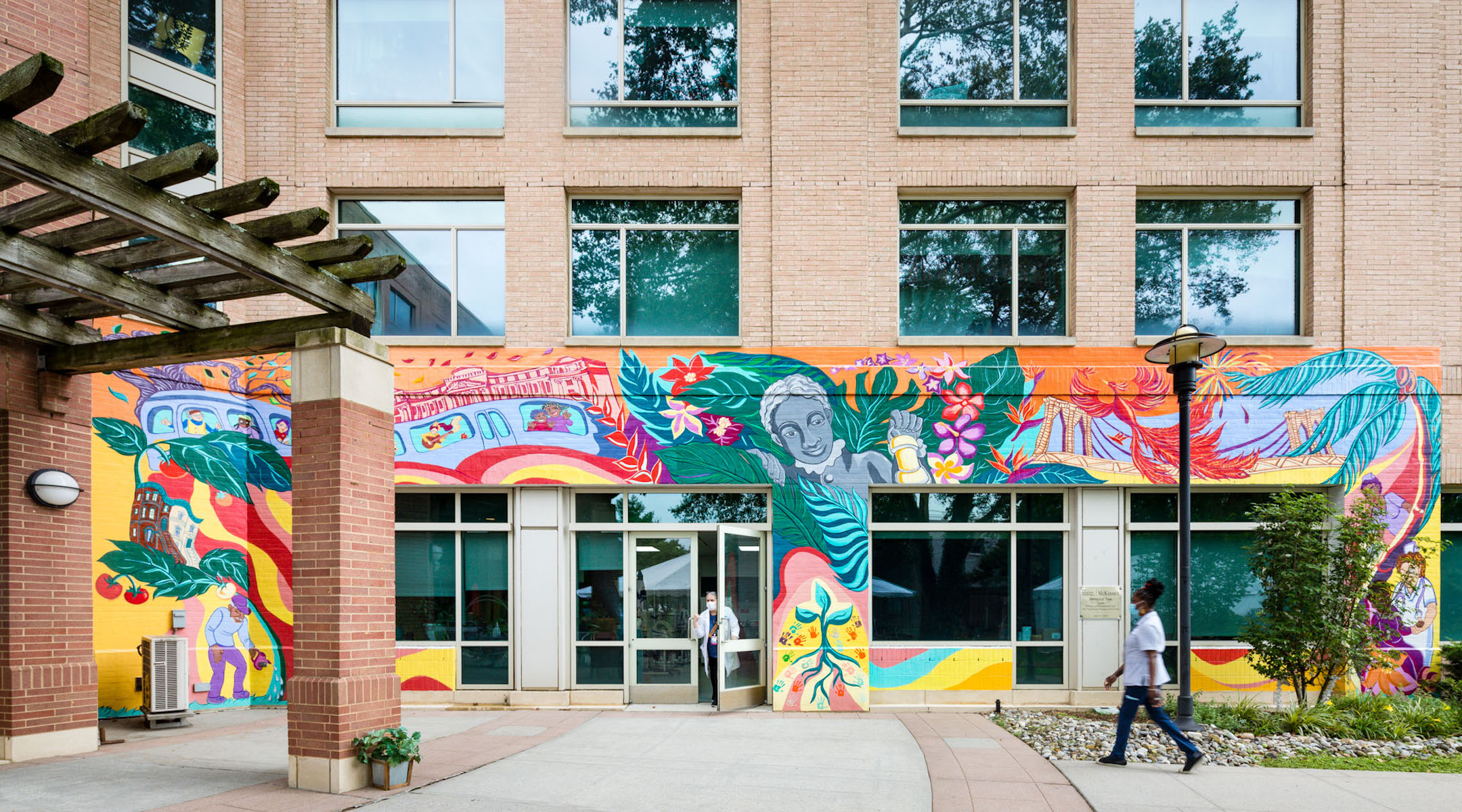
A mural by artist Peach Tao at McKinney nursing and rehabilitation center in Brooklyn. (Nicholas Knight)
How do your Jewish values and background affect the project and how do they drive your philanthropy?
LT: I grew up in a family of not so much religious values — we were Reform — but certainly Jewish values. We — my parents or even my grandparents — didn’t call it philanthropy. Starting when there wasn’t very much money, there was always acknowledgement and helping those less fortunate, especially helping the community in which one lived as well as helping the broader community. The whole foundation is certainly based on the Jewish values of tzedakah. I never call it “giving back” — I think of it as more of using resources to make important things happen that couldn’t happen without these resources, whether building a museum or hospital or helping to find a cure for a disease. I think that’s very much a Jewish value: taking care of your community and doing what you can.
New Mexico’s cash-strapped, lawsuit-plagued Jewish federation announces closure
(JTA) — After a series of bitter legal and boardroom battles within the Jewish Federation of New Mexico over the past two years, the 75-year-old community organization announced Friday that it has collapsed under the weight of the discord and will shut down.
“The main task we face is an orderly shutdown of the organization,” the federation’s newly chosen president, Robert Efroymson, announced in an email sent out to the community.
Confirming previous reporting by the Jewish Telegraphic Agency, Efroymson said the federation’s budget and programs have all but ceased to exist.
“We are almost out of money,” he wrote. “We have no employees. Critical insurance has been canceled. We cannot fulfill the purposes for which the organization was founded.”
In New Mexico, as with every state or metropolitan area served by one of the 146 Jewish federations in North America, the organization operated as a critical convener of Jewish life and distributed charitable donations to an array of local causes.
A program supporting local Holocaust survivors is now under the management of the local Jewish community center, said Efroymson, adding that the Hillel chapter at the University of New Mexico, previously a major grantee of the federation, is accepting donations directly.
Efroymson appeared to rule out the possibility of rebuilding the federation from scratch. He said the federation has been hobbled by unspecified actions taken by previous leaders, including the federation’s former executive director Rob Lennick, who has since been hired as the head of the Jewish Federation of Volusia and Flagler Counties in Florida.
“Decisions made by the prior leadership of the organization have placed us in a very poor position,” Efroymson wrote.
He vowed to detail which decisions and how they contributed to this moment once the federation’s new board has completed a probe into the matter.
“I would like to say more about how we came to this pass,” he wrote. “The truth is that there is much we still don’t know. One of the chief tasks the board has undertaken is to conduct an independent accounting review so we can report to the community what has happened.”
Lennick, who was ordained as Reform rabbi, is not a member of the Central Conference of American Rabbis, the professional association for rabbis of Reform Judaism, according to a spokesperson for CCAR.
In March, JTA revealed that two employees had sued the federation alleging misconduct by Lennick, and that about half the board resigned following a related alleged breach of trust by the federation’s executive committee, with an additional four board members staying on only seek redress by taking matters to court.
Responding to a request for comment, Eric Fingerhut, president and CEO of the Jewish Federations of North America, wrote in a statement, “We are saddened by the situation that led the Jewish Federation of New Mexico to make this decision, but believe it was the correct choice under the circumstance. More importantly, we commit that we will do everything we can in partnership with the Jewish community there to rebuild the kind of Federation they need and deserve so that their community can flourish.”
A JFNA spokesperson added that his organization, the national umbrella group for all Jewish federations, worked locally to help maintain continuity for as many “core programs” as possible.
Bruce Pearl and Auburn follow up ‘Birthright for College Basketball’ trip by hosting 150 Jewish high school students
(JTA) — Auburn University’s men’s basketball team is hosting more than 150 Jewish high school students from across the country for a weekend of volunteering and basketball.
Pegged as a follow-up to the university’s “Birthright for College Basketball” Israel trip over the summer, this weekend’s gathering is a joint program put on by NCSY, the Orthodox movement’s youth arm, and Athletes for Israel, a nonprofit that brings athletes to Israel.
“The weekend is about showing appreciation to Auburn,” AFI founder Daniel Posner told the Jewish Telegraphic Agency, citing the success of the team’s Israel trip.
During the visit to Auburn this weekend, students will participate in a basketball clinic with Auburn coach Bruce Pearl; celebrate Shabbat with Pearl and the Auburn basketball team; and volunteer at a local food bank and farm for troubled teens. They will also attend the Tigers’ season opener on Monday against George Mason University.
On Sunday, the students will compete in a coed basketball tournament hosted at a local high school, featuring players from Jewish day schools from New York, New Jersey, Pennsylvania, Texas and Florida.
“It’s not just a basketball tournament,” Posner said, touting the unique opportunity for students to meet with Pearl, whom Posner called “a true leader of the Jewish people.”
“I owe a great debt to Athletes for Israel and Daniel Posner,” Pearl told JTA. “They helped me live a dream — that is to take my basketball team and my student athletes and my staff to the Holy Land.”
Pearl added that bringing the teens to Auburn is “an opportunity for us to say thanks.”
Auburn’s Israel trip, which was likely the first of its kind for a full Division I college or professional team, featured stops at some of the country’s most famous historical and tourist sites, an interfaith basketball clinic hosted by former NBA player and activist Enes Kanter Freedom and exhibition games against Israel’s top national basketball teams.
Pearl is one of the more outspokenly Jewish and pro-Israel coaches in college sports. He co-founded the Jewish Coaches Association, which hosts an annual breakfast for Jewish NCAA basketball coaches at March Madness. He also coached in the 2009 Maccabiah Games, which he has called a career highlight.
FBI: Person who made NJ synagogue threat identified and ‘no longer poses a danger’
This is a developing story.
(JTA) — The morning after the FBI urged caution amid what it said was a “broad threat” to synagogues in New Jersey, local Jews are being told they no longer need to worry.
“Upon receipt of threat information against an unspecified New Jersey area synagogue, the FBI notified community leaders and our law enforcement partners,” the FBI announced in a statement on Friday morning. “We identified the source of the threat who no longer poses a danger to the community. As always, we would like to remind the public, to remain vigilant and if they observe suspicious activity to report it to law enforcement immediately.”
The person who was identified as having made the threat is in custody, according to an array of Jewish and law enforcement organizations. He is from New Jersey, they said.
The agent in charge of the FBI’s Newark office offered more details to state and federal law enforcement officials and hundreds of Jewish leaders on a conference call. A man who holds “radical extremist views” was identified as being behind the threat and “no longer poses a threat to the community at this time,” the agent said, according to a report from the call published in the New York Times.
The agent did not say whether the man would be charged with a crime, according to the report, which also did not indicate whether authorities had illuminated what kind of extremist views the person held. A law enforcement source told NBC New York that the man had said he was angry at Jews but did not plan to commit violence because he did not want to get in trouble.
In a different call on Friday for New York City Jewish leaders, an NYPD officer said the man had been previously known to the FBI and that the electronics he had been using had been seized. Police in New York City would step up their monitoring of synagogues and asked communities to share information about when they are holding services to make that possible, officials said.
The press conferences came after local Jewish leaders began informing their communities that the warning issued Thursday night had been lifted.
“The threat is no longer active,” the head of Golda Och Academy, a Jewish day school in West Orange, New Jersey, emailed parents on Friday morning, shortly after the school day began.
What kind of threat synagogues faced had not been specified previously and was not specified in the communication by the school or another by the Orthodox Union that was shared with some community members. The broad and unusual threat had thrown Jews and their congregations into a state of alarm late Thursday, and many synagogues interrupted their normal operations Friday to shore up their security protocols.
“We will continue our heightened vigilance, but I wanted you to have this reassuring information, which has not yet been reported publicly,” the day school leader, Rabbi Danny Nevins, wrote in his email. He said he had been told by two sources that the threat was no longer present.
Nevins’ email indicated the extent to which the threat, which comes as American Jews are already in a state of high alert, had affected members of his school community.
“Several parents have asked our security guards if they are armed,” he wrote. “We have been advised not to publicize our specific security measures, but I want to reassure you that our security professionals are all former police officers and are well trained and well equipped to respond to threats to our school community.”












